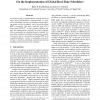Free Online Productivity Tools
i2Speak
i2Symbol
i2OCR
iTex2Img
iWeb2Print
iWeb2Shot
i2Type
iPdf2Split
iPdf2Merge
i2Bopomofo
i2Arabic
i2Style
i2Image
i2PDF
iLatex2Rtf
Sci2ools
104
Voted
RTSS
2009
IEEE
2009
IEEE
On the Implementation of Global Real-Time Schedulers
An empirical study of implementation tradeoffs (choice of ready queue implementation, quantum-driven vs. eventdriven scheduling, and interrupt handling strategy) affecting global real-time schedulers, and in particular global EDF, is presented. This study, conducted using UNC’s Linux-based LITMUSRT on Sun’s Niagara platform, suggests that implementation tradeoffs can impact schedulability as profoundly as scheduling-theoretic tradeoffs. For most of the considered workloads, implementation scalability proved to not be a key limitation of global EDF on the considered platform. Further, a combination of a parallel heap, event-driven scheduling, and dedicated interrupt handling performed best for most workloads.
| Added | 21 May 2010 |
| Updated | 21 May 2010 |
| Type | Conference |
| Year | 2009 |
| Where | RTSS |
| Authors | Björn B. Brandenburg, James H. Anderson |
Comments (0)

